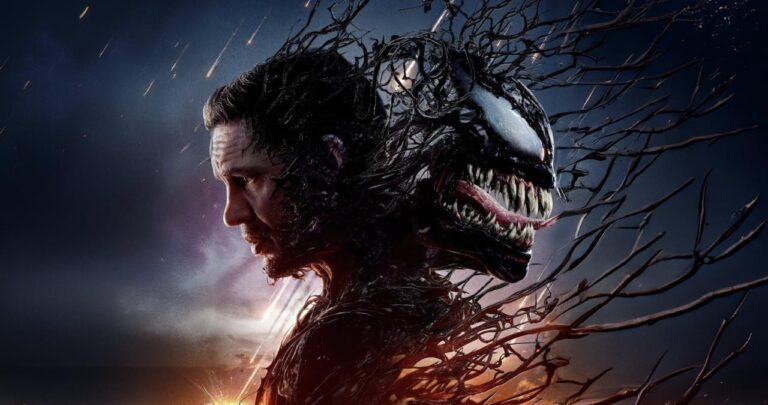Venom: The Last Dance is a film that seems to be in conflict with its own identity, trying to deliver the chaotic fun and irreverence that fans have come to expect from the franchise, while veering into unnecessarily serious territory, leaving the quirky charm of its predecessors struggling to shine through. This final chapter is packed with potential, but pacing issues and tonal imbalance prevent it from landing with the same absurd energy that made Venom an unexpected cult hit.
Where the previous films embraced their offbeat tone — fueling themselves on Tom Hardy’s wild performance and the bizarre relationship between Eddie Brock (Hardy) and his symbiote — The Last Dance often loses sight of its strengths. It kicks off with the final moments of Eddie’s brief multiversal adventure (teased in the post-credits sequences of Spider-Man: No Way Home and Venom: Let There Be Carnage) before immediately discarding that concept and zeroing in on an intergalactic threat named Knull. Portrayed by Andy Serkis, this ominous being comes equipped with an army of nigh-unkillable aliens, all tasked with hunting down Eddie and Venom, whose combined DNA hold the secret to freeing Knull from his prison. The catch: this genetic MacGuffin can only be located when Eddie and Venom are fully bonded, which necessitates a lot less screen time for the big guy.
Once again playing Eddie as a man barely holding it together under the pressures of his symbiotic bond, Hardy’s performance remains the highlight of the trilogy, full of physical comedy and an emotional depth that might seem out of place in a lesser superhero movie. There’s something hilarious, yet oddly touching, in his portrayal of Eddie’s exasperation and resigned acceptance of his relationship with Venom, who remains both his greatest burden and closest companion. Hardy’s commitment to the role continues to anchor the film, even when the narrative seems to lose its way.
And lose its way, it does, as The Last Dance frequently sidelines Eddie and Venom for an uninspired subplot involving a military unit experimenting with symbiotes. Juno Temple and Chiwetel Ejiofor, who play two of the key figures in this operation, are both talented actors, but their performances feel disconnected from the rest of the movie. Temple is weighed down by a thinly written character with little to do, and Ejiofor, despite his best efforts, delivers a performance that feels stiff and overly serious in contrast to Hardy’s off-kilter energy. Their subplot often grinds the film to a halt, and the tonal whiplash between their scenes and the Eddie/Venom antics can be jarring.
The pacing is another stumbling block. The film seems unsure of what kind of story it wants to tell, bouncing between the frenetic banter of Eddie and Venom and the heavier, exposition-laden plotlines involving alien threats and military experiments. While coherent storytelling has never been a hallmark of the franchise, The Last Dance feels especially unfocused, with long stretches where the action drags under the weight of its own lore. These sequences, particularly the ones centered on Knull and his mission to conquer the universe, feel shoehorned in to raise the stakes, but they end up muddling the film’s tone and deflating the sense of fun.
That’s not to say there’s no enjoyment to be had here, and indeed, the film shines brightest during its most absurd moments. Whether it’s Venom participating in a spirited dance number with Mrs. Chen (Peggy Lu) choreographed to ABBA’s “Dancing Queen” or experiencing the highs and lows of casino gambling, these scenes remind us why the franchise became such a cult favorite in the first place. The best parts of The Last Dance lean into the anarchic, unpredictable dynamic between Eddie and Venom, but the movie seems hesitant to fully embrace this chaotic energy, opting instead for an overly serious tone that weighs it down; what often served as a focal point of the previous films now feels like an afterthought.
There’s enough of the Eddie/Venom dynamic to keep fans engaged, but the movie’s insistence on prioritizing plot-heavy exposition and unnecessary subplots holds it back from being the chaotic, joyful mess it could have been. Hardy remains a standout, delivering a performance that once again elevates the material, but it’s not enough to compensate for the film’s deeper flaws. In the end, Venom: The Last Dance is a movie that crumbles under the weight of trying to accomplish too many goals: introducing a new villain, planting seeds for future installments and spinoffs, and bidding farewell to Hardy’s involvement. For fans of the first two films, there’s still fun to be had, but the movie ultimately feels like a missed opportunity — a final dance that never quite finds its rhythm.

